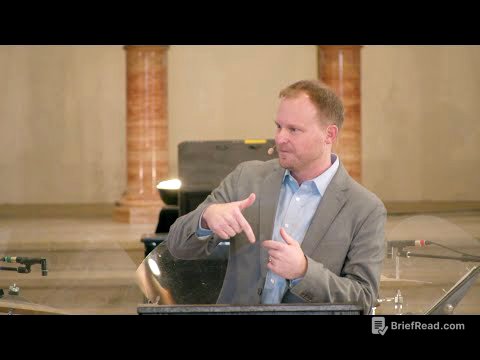TLDR;
This video explores the concept of talent and whether it is innate or can be developed later in life. It references psychologist Renzulli's three conditions for genius: task obsession, creativity, and high intelligence, all of which can be nurtured. The video also addresses why many children with potential may not reach their full potential due to societal pressures and a focus on academics. It encourages parents to believe in their child's potential and to support their interests and curiosity, regardless of IQ.
- Talent can be developed later in life through nurturing task obsession, creativity, and intelligence.
- Societal pressures and a focus on academics can hinder the development of a child's unique talents.
- Parents should believe in their child's potential and support their interests and curiosity.
The Nature of Talent: Born or Made? [0:02]
The video starts by questioning whether talent is innate or can be developed later in life. While acknowledging the existence of children with seemingly innate abilities, the speaker leans towards the view that talents are made rather than born. Referencing American psychologist Renzulli, the speaker identifies three conditions for talent development: task obsession, creativity, and high intelligence. These conditions, while sometimes appearing innate, can be nurtured through continuous stimulation, achieving experiences, and tolerating mistakes.
The Three Conditions for Genius [0:15]
The speaker elaborates on Renzulli's three conditions for genius, emphasizing their potential for postnatal development. Intelligence can improve with continuous stimulation and a supportive environment. Task immersion grows through experiences of achievement and success. Creativity flourishes when mistakes are tolerated, questions are encouraged, and collaborative work is enjoyable. If these conditions are met, the speaker believes that anyone can develop their talents and potentially become a genius.
Why Giftedness Often Goes Undiscovered [0:52]
The video addresses why many children with potential live ordinary lives. The speaker shares an anecdote about a child talented in gymnastics whose parents prioritized academics, hindering the child's athletic development. The speaker suggests that society's focus on academic achievement often overshadows other talents. The speaker shares an example of a student with behavioral problems who wrote exceptional poetry, but whose talent was not fully recognized or developed by his parents.
Nurturing Potential in Ordinary Children [0:04]
The speaker addresses the concern of parents who view their children as ordinary. The speaker suggests that the perception of ordinariness may stem from comparing children to others who excel early in specific areas. The speaker emphasizes that each child has a unique timeline for revealing their talents. The speaker encourages parents to focus on identifying and developing their child's strengths rather than trying to create a balanced skill set.
Believing in Your Child's Potential [0:05]
The speaker urges parents to believe in their child's potential for self-expression, referencing Renzulli's three conditions for genius as traits that can be developed postnatally. The speaker advises parents to adjust their approach if their child struggles, suggesting alternative methods like games or stories to engage their interest. The speaker stresses the importance of building background knowledge through related books and activities.
The Role of IQ in Genius [0:07]
The video addresses the relationship between IQ and genius. The speaker clarifies that IQ is a numerical measure of specific intellectual abilities, while genius is a more complex concept. The speaker argues that even with a lower IQ, a child can possess the seeds of genius if they have a strong interest, curiosity, and the ability to explore and create. The speaker emphasizes that tenacity and creativity are more important than high intelligence. The speaker encourages parents to look beyond IQ scores and observe when their child's eyes sparkle with interest and what they create when they are absorbed in a task.









